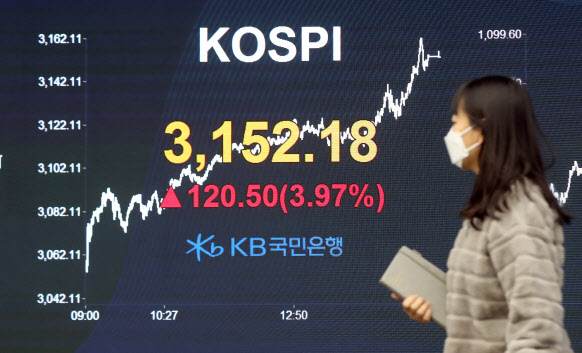|
The KOSPI increase rate in the first week of January, after the financial crisis
According to market points on the 10th, last week (4-8), KOSPI closed at 3152.18, up 278.71 points (9.69%) from 2873.47 the previous week. It is the highest weekly rate after the global financial crisis, which rose 18.57% on October 27-31, 2008. Although similar to other countries, the rate of increase is unrivaled. Last week, the top three indices in New York in the US also broke all-time highs, but the Dow Jones and S&P 500 indexes rose 1.61% and 1.82%, respectively, and the Nasdaq rose only 2.43%. Japan’s Nikkei 225 Index, which reached the highest level in 30 years, also rose 2.53% in one week, while major overseas indices such as Taiwanese Gakwon Index (4.96%), Hong Kong Hang Seng Index (2.38%), and Eurostock 50 (2.6%) rose to 5%.
Most securities firms expected the KOSPI to exceed 3000 this year, but the response is surprising in terms of speed. Heo Jae-hwan, a researcher at Eugene Investment & Securities, said, “I didn’t think it would be impossible for the KOSPI to cross the 3000 line, but I didn’t know it would be the beginning of the new year at the time of achievement.”
The possibility of adjustment is raised as the main driver of the sharp rise is not earnings. This is because the KOSPI, which rises steeply due to sentiment, issues, and supply and demand, could lead to a sharp turnaround in investment sentiment and supply and demand from the point when the gap between earnings and stock prices is recognized.
Lee Kyung-min, a researcher at Daishin Securities, said, “Because of the change in the global macro environment and the revaluation of the Korean asset market, the KOSPI 3000 breakthrough is not the end but the beginning.” It is the time to watch out for volatility, and it is necessary to take an agile response in the short term by checking the market reaction.”
The’performance standard eye level’ for the KOSPI, which is currently taking a record high, is the lowest in history. According to F&Guide, the KOSPI’s 12-month lead price-earnings ratio (PER) reached 13.37x, the highest record, based on the initial price of 2890 on the 7th. Compared to the previous high of 2437 on August 13, last year, the Kospi has increased by more than 450 points thanks to improved performance in about five months.
However, as the P/E is hitting the 3100 line and is hitting an all-time high, the pace of earnings outlook has not kept pace with the stock market rise. Compared to the 3-year average PER, it is well over twice the standard deviation. Compared to recent years, the KOSPI is receiving the most high evaluation compared to its performance in history.
“The Buffett Index is out of trend as much as the IT bubble and financial crisis”
Several indicators indicate that the domestic stock market is overheating. The’KOSPI 200 volatility (V-KOSPI 200) index’, called the Korean version of the fear index, also surged. This index is an indicator of volatility of the KOSPI 200 index using the KOSPI 200 option price, indicating the possibility of stock market volatility over the next month. It surged from 22.09 at the end of last year to 29.18 on the 8th. It has reached a similar level in about three months since October 1, last year, when it hit the previous high (31.79).
In general, Yuanta Securities researcher Jung Inchi said, “Generally, the surge in V-KOPSI, which shows the implied volatility of options in the process of rising underlying assets, is quite unusual and is evaluated as overheating. However, the KOSPI 200 index trading volume recorded the highest level since last June It is in the overheating phase due to the fact that the company is doing so, but the sustainability of the uptrend is still superior.”
In addition, the’Buffett Index’, a traditional indicator of overheating, is also high. Warren Buffett used the nominal GDP divided by the stock market cap as a measure of stock market overheating, assuming that a country’s gross national product (GDP) would converge to the market capitalization of all listed companies. Currently, KOSPI’s Buffett index has exceeded 1x.
IBK Investment & Securities Research Director Jung Yong-taek said, “The Buffett index for KOSPI has exceeded 1x, which means overheating. In fact, what is more important than this absolute number is how far away from the trend is it?” It is located only twice as long, but there were only two times before the past IT bubble and the financial crisis.”
“It is possible to argue that this is because the interest rate has fallen significantly, but if you match this ratio with the market interest rate, the ratio of the stock market capitalization to the nominal GDP is very high, even if you take into account the recently lowered interest rate.” There is a big gap,” he added.
In addition, the relative strength index (RSI), a technical indicator, recorded 84.686 as of the 8th, indicating overheating. In general, overbought periods of 70 and above see 30 below as overbought periods.

